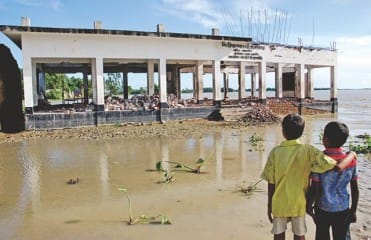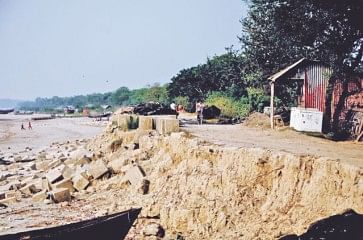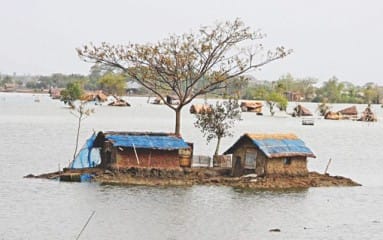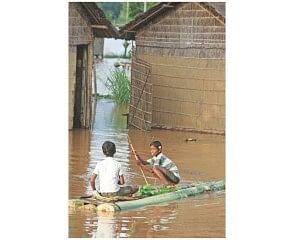UN Climate Conference in Doha: Challenges and Opportunities
Climate change emerges as one of the greatest environment, development and global governance challenge that mankind has ever faced. Most communities of different countries are starting to feel some of the direct or indirect impacts of climate change related phenomena or episodic events. The scientific challenges of attribution of experiences of events to the specific aspects of climate change still remain difficult. But the cumulative events are making themselves felt in countries, and ecosystems or communities. On the one hand, the non-literate communities across the world are mentioning “something is not right” in their surrounding with agro-climatic or hydro-climatic experiences. They are observing shift in the timing and nature of precipitation or temperature changes.
At the other end scientific evidences are piling up. The fifth Assessment process of the Inter Governmental Panel on Climate Change (IPCC) is progressing well and the assessment will help raise some issues and resolve other outstanding questions.
Increasing impacts
The poor will be most affected and particularly in the low latitude countries and societies. But recent experiences of climate related extreme events such as Hurricane Sandy has demonstrated unprecedented wind velocity affecting the East Coast of the USA. The cost of damages is increasing rapidly. In the case of Sandy, an early estimate of damage ranges between US$ 60 and 200 billions. Recent wildfires and floods have exposed the vulnerability of Australia. The winter extremes with snow storms are also being experienced in Europe. In many developing countries food, water and energy securities are facing new challenges.
So as has been predicted by many, climate change will not spare the rich countries, though the poor countries and poor societies will experience the impacts of climate change and expose their vulnerability. It is in this setting that the 18th Conference of Party (COP 18) of the climate convention (United Nations Framework Convention on Climate Change (UNFCCC) was held in Doha in the Middle East.
Locus standing of COP 18
These COPs vary in their importance, and potential to delivery vary significant results or agreements. In that sense COP 18 was perceived as a “low COP” as opposed to the COP 16 held in Copenhagen attended by many heads of nations, was a “high COP”. The leadership often offered by the host country is critical in obtaining successful outcomes. But the leadership in Doha showed the lack of experience in handling a major diplomatic challenge like COP 18 to deliver significant results and outcomes.
However it is to be noted that this is happening at a time when the industrialised countries were more inward looking and in financial crisis. For US, its presidential election and dire economic situation, intense incapacity for both Presidency and Congress to work together had relegated climate change in its importance. European Unions member countries were undergoing financial crises in several of its members. Japan was facing challenges of energy security in a post Tsunami and post Fukoshima disasters.
Developing countries were willing to move faster in making major decisions on climate change related issues including mitigation, adaptation, finance, technology and emerging issues such as “loss and damage”. Kyoto Protocol somehow managed to survive with US, Canada, Japan and Russia opting out of it. That resulted in the virtual collapse of the market value of carbon.
The negotiation continues at a low key
Given all these constraints, the enthusiasm of continuing with the climate negotiation process with all actors participating is a sign of hope. However, one pessimistic scenario that lack of agreement may take climate change negotiations down the route of trade negotiation impasse. Such a disastrous outcome in the near future cannot be ruled out totally, if serious commitment to carbon reduction (mitigation) and rapid risk reduction (adaptation and financial allocation) is not assured.
But science is becoming stronger and louder. Climate change is becoming one of the centre points of research by multi-disciplinary approaches across the world, both in northern and southern countries and through many collaborative initiatives. Major reduction in carbon (mitigation) to change the course of major impacts does not seem to have succeeded. More extreme events are being experienced and adaptation efforts, particularly in developing countries have been initiated. There is a greater demand for fund transfer from Annex-1 (industrialised) countries to developing and least developed countries. The call for climate justice is becoming louder.
In the Bangladesh context
Bangladesh is being established as one of the most vulnerable countries if not the most vulnerable country. Recent modeling research shows that besides all the other impacts (sea level rise, increased cyclone, floods, drought river bank erosion, erratic rainfall, migration, health impacts, threats to food and water securities) Chittagong Hill-Tracts is likely to be exposed to similar total amount of rainfall concentrated over a shorter period, enhancing the probability of flooding and increased land slides.
It is in such a context that a large delegation from Bangladesh went to Doha to participate in COP 18 and raise the concerns of Bangladesh's vulnerability and share its achievements on the global climate change with other countries' delegations.
The COP-18 process
The delegates from 191 countries gathered in Doha, Qatar and attended the UN Conference of the Parties (CoP-18) in late November to early December 2012. Over 17,000 participants (involving government negotiators, climate scientists, environmental activists and social development and human right groups) attended the COP as well as in various parallel sessions and side events to influence the global decisions for an immediate agreement of the nations (in relation to second commitment of Kyoto Protocol) and urgent actions in mitigation, adaptation, resource allocation and technology transfer. The President of Qatar termed it as a “golden opportunity” to make progress on a new global climate deal, but the CoP-18 ended with a weak “Doha Climate Gateway”, which allows the negotiation process up to 2015 to agree on a more appropriate structure and wider targets for the second commitment period of KP.
It is acclaimed that the continuation of KP beyond December 2012 (though it is agreed only by few of the original KP parties and at a relatively low level of target for emission reduction) saved the global negotiation process and created a window to take up the process to an ambitious target level by involving the major emitters including the USA within 2015. This was an attempt to keep the ailing KP alive with some emergency support.
Major negotiation groups, priorities and outcomes
The negotiation process was mainly dominated by the USA, their allies and major groups including the European Union, BASIC group, LDC, AOSIS and African group. The BASIC group (with Brazil, South Africa, India and China) played a key role in Doha and called for more ambitious emission reduction targets from the developed countries as well as demanded finance, capacity building and technology transfer for both mitigation and adaptation.
The representatives from the Least Developed Countries (LDC) and poor countries felt that climate change action and poverty alleviation must be integrated. In Doha, they demanded an ambitious new KP second period with higher commitment from developed countries and BASIC group which would be consistent to contain global temperature rise within 1.5 degree Celsius and annual climate finance of USD 60 billion from now until 2015.
Bangladesh along with the MVC (Most Vulnerable Country) groups also strongly demanded higher cut in carbon emission by the developed countries and greater financial and technological support for adaptation primarily to reduce climate risk and mitigation as well. The EU group was a key player in the recent COPs and in Doha. They looked for enhancing action in line with the Bali Action Plan (BAP) and Durban Platform and worked for the second commitment period of KP.
The result of Presidential Election in 2012 has left many with the hope that the USA might play a pro-active role in Doha, but they behaved business as usual and made no commitment at the COP-18 for the KP second period which disappointed the global communities greatly. Ms. Christiana Figueres, the UN Climate Chief called upon President Obama to establish a strong leadership position at the COP-18 and said, “The US has the opportunity to contribute to the very important outcomes needed at Doha and show leadership”.
Recently, the US President Obama has accepted the science of climate change and growing impacts worldwide, but he did not commit to higher emission reduction and climate mitigation action in the perceived fear of economic meltdown and unemployment. It appears that most US will do will focus on “Cap and Trade” within the US. This will have only limited mitigation impacts.
Second commitment period of KP and follow-up action for ADP
In the support of Durban Platform, the draft decision at COP-18 calls for widest possible cooperation by the all parties in an effective and appropriate international response, with a view to accelerating the reduction of GHG emission. The KP has been amended so that it will continue as of 1 January 2013.
The parties have decided that the length of the second commitment period would be 8 years. The countries that are taking on further commitment under KP have agreed to review their emission reduction commitment at the latest by 2014, with a view to increasing their respective levels of emission reduction.
However, in the second commitment period, KP's binding commitments covers around 15% of the total of amount global emission, while the USA accounts for 16% of global emission has not signed up the treaty. Keeping 85% of the global emission out of the treaty is seriously inadequate and faulty. The parties have agreed to speedily work a universal climate agreement covering all countries from 2020, to be adopted by 2015 for deeper carbon cuts to that the world can stay below the 2 degree Celsius temperature rise by 2100. But it is evident that the rate at which Green House gases are being emitted, keeping global temperature within 2°C by 2021 will be almost impossible in the absence of aggressive mitigation actions.
Shared vision, mitigation and adaptation
The Doha decision strongly supports a shared vision for long term cooperative action, including global goal for emission reduction to inclusive the ultimate objective of the convention and upholds the “principles of common, but differentiated responsibilities and respective capabilities” of the nation by taking into account the social, economic, environmental and other relevant factors. It calls for enhanced actions for mitigation and adaptation to climate change that are to be measurable, reportable and verifiable (MRV) to the UNFCCC.
It suggests formulation of Nationally Appropriate Mitigation Actions (NAMAs) by the developing country parties as well as policy approaches and positive incentives on issues relating to reduction of emission from deforestation and forest degradation (REDD) in developing world.
For urgent actions on adaptation, the Doha draft decision reaffirms that adaptation is a challenge faced by all parties and that enhanced action and international cooperation on adaptation is urgently required to enable and support implementation of adaptation action aimed at reducing vulnerability and building resilience in developing countries. Further it approved a three year work plan for implementation of loss and damage program, so that vulnerable countries can claim compensations and more resources for adaptation. The Doha Decisions encourage growing role of regional adaptation centers and network for adaptation. The CoP-18 decided to establish a technology centre for mitigation and adaptation. It was confirmed that a UNEP led consortium will work as host of the Climate Technology Centre (CTC) for an initial term of five years.
Climate finance
The global communities are greatly disappointed since little progress has been made in funding under UNFCCC to help developing countries. The developed countries have promised to provide up to $100 billion per year from 2020 onwards and only $30 billion as initial fund for three years. Germany, the UK, France, Denmark, Sweden and EU Commission have announced financial pledges in Doha for the period up to 2015, totaling approximately $6 billion only, while the developing countries demanded at least $60 billion over the next 3 years (2013-15). Further, in the earlier CoPs, it was decided that the climate finance would be new and additional to development fund, but now they consider the proposed climate fund as part of the international development assistance. The developing countries put pressure on advancing the Green Climate Fund, which was agreed in Copenhagen.
The civil society group and members of the Climate Action Network (CAN) have criticised the CoP-18 for not showing sincerity and adequate efforts for setting goal and structure in relation to finance for developing countries. It is strongly felt that plenty could be accomplished in Doha, particularly with regard to financing for adaptation and mitigation efforts of the poor countries. More work should be done on governance of Green Climate Fund and innovative finance. Parties and negotiators must do further home work before the next CoP 19 to be held in Warsaw, Poland.
The representatives of the small farmers, women and indigenous people termed the draft Doha agreement (in relation to mitigation, adaptation and finance allocation) as a death warrant for the poor and indigenous people throughout the world. They demanded significant changes in the agreement to remove the weakness before the next COP.
The role of Bangladesh at COP 18
Bangladesh had a large delegation with government negotiators, climate experts, Members of the National Parliament, civil society representatives and journalists. Everybody worked collectively under the leadership of the Minister Dr. Hassan Mahmud of Environment and Forest of the Government of Bangladesh. In the negotiation process, Bangladesh took part through LDC, G77 and MVC groups. Bangladesh put forwards the demands of developing countries. Bangladesh delegations along with NGOs have organized a side event on Loss and Damage, which drew much of the attention of the global negotiators.
The Bangladesh delegation with LDC also suggested an “International Mechanisms for Loss and Damages”, which may open up the door to potential claims for cooperation in future for adaptation and climate risk reduction. Bangladesh delegation further organised a number of press conferences highlighting the climate risks and vulnerability as well as adaptation and mitigation action to tackle climate change in Bangladesh.
The performance in Bangladesh was well acclaimed in Doha. Group coordination worked well. The delegates and other Bangladesh participants felt that all can work together and enhance preparation before going to CoP. We can make great progress in implementation of adaptation and mitigation projects and fund management in the country level to demonstrate good practices following MRV criteria, which may create further avenue for global cooperation under UNFCCC and beyond through bilateral and multilateral co-operations in climate change and promoting sustainable development. We have to build a stronger national capacity in planning, implementation and monitoring of projects under BCCASP and NAPA. To access further global fund, we must show good governance in managing climate funds and increase national capacity to comply with the emerging UN tools of MRV.
Due to good initiatives and significant general performances of Bangladesh by all actors including government, scientists, NGO, civil society and activists. Bangladesh has a huge goodwill from most other countries' delegations.
Future challenges and immediate next steps for Warsaw
The Doha is termed as a “Low COP”, but it made few key decisions and bridged the vital gaps between the earlier and older regimes of climate negotiation (which was near to a collapse in Durban in 2011) and the new regime in the second commitment period of KP. So, it also puts forwards a number challenges to the nations and negotiators. First of all, we have to recognize that climate change is faster than initially thought with greater impacts on natural, social and human systems. Examples are: Sandy in the USA, frequent typhoons in the pacific, floods in China and Indonesia and the Cold Wave and snow fall in Europe and America. So the global communities are looking for a comprehensive but quicker policy decisions and real actions on the ground. In the recent part, we saw that negotiation process and outcomes were constrained by the narrow national and economic interests of the major parties, mainly by the USA and their allies. Strong political will and dynamic leadership must carry forward the future negotiations to a higher level to save the planet and the people from the devastation and runaway impacts of climate change. Bangladesh can play an even more pro-active and assertive role in future COPs for our national interest and survival.
Bangladesh is playing a significant role at the global system. The government has taken several major progressive actions for capacity building in addressing climate change.
* Formulation and stepwise implementation of the Bangladesh Climate Change Strategy and Action Plan (BCCSAP). The BCCSAP has been recognized all over the world as an excellent initiative;
* The formulation of two funds: (a) The Bangladesh Climate Change Trust Fund (BCCTF) from its own resources, (b) The Bangladesh Climate Change Resilience Fund (BCCRF) with contribution from development partners;
* The establishment of the Climate Change Unit which has been transformed into the Climate Change Trust;
* A large number of projects have been allocated to several government agencies. These need to be assisted with rigorous monitoring and technical support;
* Non-government allocation is being managed by PKSP;
* A large number of scientific and field based projects are being undertaken by govt. agencies research centres, Universities, NGOs and civil society;
* A number of projects and initiatives are being undertaken in cooperation with development partners; and
* Several capacity building initiatives are being undertaken by government, NGOs, research institutes and development partners.
All these efforts has the potential of making Bangladesh a leader amongst developing countries to lead in science, policy, peoples participation, community based solutions, good governance practices, optimal utilization of climate funds -- present and future. Organization of six international conferences on Community Based Adaptation (CBA). The next Seventh International Conference on CBA (CBA-7) is going to be held in Dhaka during April 18-25, 2013.
It is quite evident from the discussion at the corridors of the COP and various science and policy conferences that the partners from both Northern and Southern countries have high expectations from Bangladesh to play a leadership roles in science, policy, good governance, fund allocation and management.
Further there is also a higher expectation that Bangladesh plays a key role amongst the developing countries, particularly, NGOs worldwide. It is also well recognized that in Bangladesh government, NGOs and research institutes are working in close collaboration. Once it can be clearly demonstrated that the experiences and outcomes from various policy initiatives, projects, knowledge management activities are feeding into the capacity building at national and international levels, there is interest for greater support and financial resources from development partners. It is also most important that significant institutional and absorption capacities are built into the emerging institutions and initiatives.
This, of course, needs high quality of human resource with appropriate background and training. For achieving this an urgent programme is needed creating a team of the present science-policy-practice and governance leaders to organize a servos of training programmes to create a cadre of climate experts for appropriate government and non-government. institutions with requisite absorption capacity and technical competence areas as such as negotiations, different natural, applied and social science disciplines, governance, fund management, working with different communities of practice. This will help in creating such cohorts of expertise.
This is a major gap that need to be addressed urgently. Bangladesh is already an accepted leader in the developing world in climate change. It is fortuitous that some of the brightest minds in Bangladesh have focused on climate change and a few are well recognized world leaders in their respective fields of climate change. It would be useful to build on this. Climate change is here to stay and gaining increasing interest, particularly in Bangladesh. Integrating or mainstreaming climate change into development is a major challenge. Implementation with accountability and good governance by all actors remains the next big challenge.
Global expectations
International recognition, leadership and acceptace of Bangladesh essentially depend on the quality and diversity of activities, initiatives, policies, good governance and field based practices. Hence a dual approach of building national capabilities and working for international acceptance and interactions will be most helpful.
On the international front and for negotiation a set of priority areas need to be identified and consensus built firstly at the national level. Based on these, specialisation and capacity of a wide ranging and qualified actors both in government and non-government sectors will have to be developed for the short and the medium term. The knowledge emanating from many and varied field initiatives will need to be synthesized. The world of climate experts hope to get this contribution from Bangladesh. We should strive to meet these expectations.
In the negotiation process, Bangladesh must continue to demonstrate its leadership to the established and emerging groups. These are the Least Developed Countries (LDC) and the Most Vulnerable Countries (MVC) groups. Bangladesh is in a good position to encourage SAARC to take a regional approach towards finding climate solutions. The SAARC has recently gained observer status to UNFCCC process and has three separate declarations on climate change (Dhaka, Thimpu and Addu, Maldives).
A new emerging issue is “Loss and Damage Assessment”. Several Bangladeshi institutions are already working on Loss and Damage. The government of Bangladesh and the key researcher should work closely together to give global leadership on Loss and Damage. This has potential for transfer of large funds for Adaptation and Disaster risk reduction in Bangladesh. But intellectual and methodological challenges, particularly on attribution, are enormous.
Though the negotiation process is weak, the financial mechanism on climate change adaptation and mitigation could stimulate a new climate resilient development path. Bangladesh is in a good position to lead this new development paradigm.
The writer is Executive Director of Bangladesh Centre for Advanced Studies (BCAS) and Chairman Climate Action Network South Asia (CANSA).


 For all latest news, follow The Daily Star's Google News channel.
For all latest news, follow The Daily Star's Google News channel. 







Comments